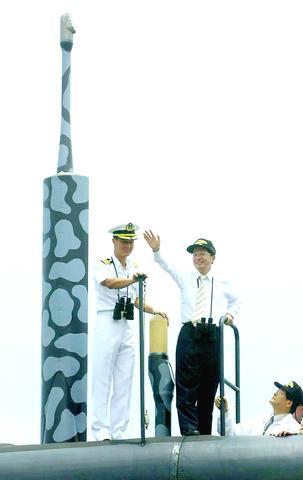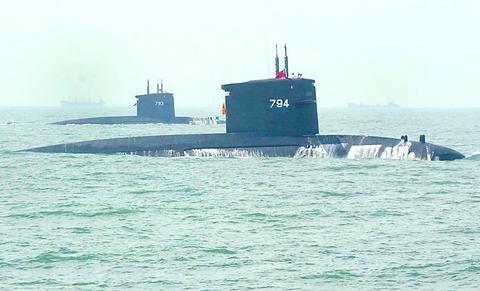More than 100 reporters accompanied President Chen Shui-bian (
"Submarines are the most ideal weapons we can use during a combat situation in the Taiwan Strait. They are also a basic weapon for an island nation such as Taiwan to use to defend itself," Chen said.
Chen made his remarks at the navy's Mercury Port inside Tsoying's largest naval base, in Kaohsiung. The Mercury Port is an exclusive port for the country's four submarines, which include two US-made Guppy-class vessels and two Dutch-made Zwaardvis-class vessels.

CHIANG YING-YING, TAIPEI TIMES.
It was the president's second time aboard a submarine since he took office in 2000, but it was the first time that he led a group of reporters through a submarine joint military exercise.
Chen hopped in the SS-794 Sea Tiger while reporters were divided into two groups to go aboard the Lafayette-class frigate PFG-1207, the Wu Chang, and the SS-793 Sea Dragon, which also had Presidential Office Secretary-General Su Tseng-chang (
According to Captain Chou Yih-chun (周益群), the commanding officer of the SS-793, yesterday's exercise was participated in by two submarines, three frigates, one S-70C helicopter and one S-2T Turbo Tracker aircraft. During the exercise, the two submarines were opposed to the three frigates and two aircraft.

PHOTO: CHIANG YING-YING, TAIPEI TIMES
According to the MND, the two submarines successfully destroyed the frigates using torpedoes in the simulated battle, and the entire action was processed on a computerized simulated program.
The distance between the SS-793 and SS-794, which were the focus of yesterday's exercise, was approximately 300m. Both submarines cruised at the speed of 18 knots and dived to reach a depth of 17.5m at a location which was approximately 8.8km away from Tsoying base.
Chou said that the Zwaardvis-class submarines are capable of diving to a depth of 240m.
In addition to the simulated naval battle, the two submarines also carried out an "emergency surface" to end the entire exercise.
During the exercise, the president suffered from minor sea sickness, but he still took the helm of the SS-794 and acted like a sailor for a few minutes.
The entire exercise lasted approximately two hours.
Due to concerns involving the safety of the president and the reporters, the navy canceled several items during yesterday's exercise. However, some politicians complained that the president was wasting public funds and leaking crucial military secrets by what he did yesterday.
In addition, crtics said, a small-scale military exercise like yesterday's would not help sailors in a real combat situation.
"There might be concerns that classified military information might be leaked," said Democratic Progressive Party Lawmaker Kuo Jung-tsung (
The navy also invited several female petty officers to board the submarines and frigates and participate in yesterday's exercise. However, it is still not permitted for female personnel to serve on a submarine.
"We do not have enough room inside a sub [for additional facilities for women] and may not be able to provide them with adequate privacy, either," said Wu Shang-fu (吳商福), a senior first class petty officer onboard the SS-793.
Also see story:

The CIA has a message for Chinese government officials worried about their place in Chinese President Xi Jinping’s (習近平) government: Come work with us. The agency released two Mandarin-language videos on social media on Thursday inviting disgruntled officials to contact the CIA. The recruitment videos posted on YouTube and X racked up more than 5 million views combined in their first day. The outreach comes as CIA Director John Ratcliffe has vowed to boost the agency’s use of intelligence from human sources and its focus on China, which has recently targeted US officials with its own espionage operations. The videos are “aimed at

STEADFAST FRIEND: The bills encourage increased Taiwan-US engagement and address China’s distortion of UN Resolution 2758 to isolate Taiwan internationally The Presidential Office yesterday thanked the US House of Representatives for unanimously passing two Taiwan-related bills highlighting its solid support for Taiwan’s democracy and global participation, and for deepening bilateral relations. One of the bills, the Taiwan Assurance Implementation Act, requires the US Department of State to periodically review its guidelines for engagement with Taiwan, and report to the US Congress on the guidelines and plans to lift self-imposed limitations on US-Taiwan engagement. The other bill is the Taiwan International Solidarity Act, which clarifies that UN Resolution 2758 does not address the issue of the representation of Taiwan or its people in

US Indo-Pacific Commander Admiral Samuel Paparo on Friday expressed concern over the rate at which China is diversifying its military exercises, the Financial Times (FT) reported on Saturday. “The rates of change on the depth and breadth of their exercises is the one non-linear effect that I’ve seen in the last year that wakes me up at night or keeps me up at night,” Paparo was quoted by FT as saying while attending the annual Sedona Forum at the McCain Institute in Arizona. Paparo also expressed concern over the speed with which China was expanding its military. While the US

SHIFT: Taiwan’s better-than-expected first-quarter GDP and signs of weakness in the US have driven global capital back to emerging markets, the central bank head said The central bank yesterday blamed market speculation for the steep rise in the local currency, and urged exporters and financial institutions to stay calm and stop panic sell-offs to avoid hurting their own profitability. The nation’s top monetary policymaker said that it would step in, if necessary, to maintain order and stability in the foreign exchange market. The remarks came as the NT dollar yesterday closed up NT$0.919 to NT$30.145 against the US dollar in Taipei trading, after rising as high as NT$29.59 in intraday trading. The local currency has surged 5.85 percent against the greenback over the past two sessions, central